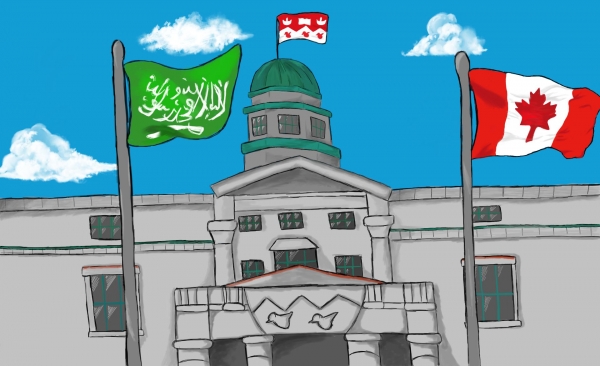Saudi Arabian students studying at Canadian universities were given until Aug. 31 to leave Canada after an announcement terminated all state-sponsored scholarships allowing Saudi students to study in the country. The dispute began in early August, when Canadian Minister of Foreign Affairs Chrystia Freeland called for Saudi Arabia to release civil-rights activist Samar Badawi in a tweet, leading to a political feud resulting in the withdrawal of Saudi students. This follows a problematic history of Saudi Arabia’s human rights affairs, including its harsh stances on feminist advocacy, migrant workers, and labour laws.
Following the Aug. 31 deadline, at least 20 Saudi students remaining in Canada filed asylum claims in order to stay in the country. 327 Saudi students were registered at McGill in the past academic year, out of a total of more than 15,000 across Canada. It is not known how many have departed Canada, or how many will attempt to continue their education at McGill.
According to Siddak Ahuja, a U2 Arts student from the United Arab Emirates, disagreements between Saudi Arabia and Canada may affect other students from the Middle east as well.
“There is a glaring inequality and abuse of peoples in both countries. It’s racism, and on a socio-economic scale,” Ahuja said. “The UAE was given a pro-Saudi account of the issue as both countries are part of the Gulf Cooperation Council (GCC), so their foreign policies are very similar. When rifts occur, all GCC countries show solidarity with Saudi.”
Professor Malek Abisaab, a professor in Modern History in the Middle East, believes that the sudden feud with Canada is an attempt by Saudi Arabia to keep a grip on domestic support and curry favour with the United States.
“Saudi Arabia is in a position of pressure,” Abisaab said. “More than 30 per cent of people are unemployed, inflation is hitting hard, and there are no political rights. Opposition is treated harshly with violence in some cases. The Crown Prince is trying to do anything he can to please Trump so that the Yemen war can continue to be covered by America. I think we need more pressure on Saudi Arabia to stop the war on Yemen and to open up political life in Saudi Arabia for Saudis to prosper and gain political rights.”
McGill has released two updates on the departure of Saudi Arabian students. In an email to The McGill Tribune, Interim Deputy Provost (Student Life and Learning) Fabrice Labeau stated that the university has yet to determine the full impact of the Saudi government’s decision.
“Our Saudi students and medical trainees are an important part of our community,” Labeau said. “McGill is actively investigating the impact of this decision on them, as well as on our programs, and is working with partner institutions and Universities Canada to stay abreast of any developments.”
Ahuja further expressed frustration with the Saudi government’s actions, and sympathy for those affected by it.
“I feel like Saudi Arabia grossly overreacted.” Ahuja said. “They not only made a fool of their reputation around the world by doing this, they also left their future generation dissatisfied. Pulling students out of a foreign university ruins their opportunities and careers.”
Abeer Almahdi, U2 Arts student from Syria, is equally concerned for the Saudi Arabian students and the difficult decisions they have been forced to make, even if they find a way to remain in Canada.
“Most of these students either grew up in Saudi Arabia […] have family there, or have some sort of cultural tie to the country, so this is a very hard time for them regardless of whether they want to stay here or not,” Almahdi said. “They’re torn in the sense that here is opportunity, but there is family, heritage, and culture. So I don’t think we should reduce the situation to be as polar as we might think it is.”
In terms of supporting her peers, Almahdi also calls for the McGill community to be mindful of the diverse backgrounds of its students.
“One of the things we have to do as students is not just make sure their transition to whatever decision they choose is as smooth as possible, but also to make sure that we use these things as a catalyst for increasing minority representation,” Almahdi said.









holy shit. AGAIN????????
Fix your illustration, the Saudi flag must always be to the left of the flagpole. Putting it on the right is blasphemy against the Prophet Muhamad (PBUH). McGill Tribune offends Islam!